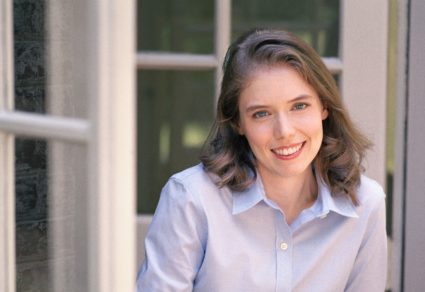
A federal panel reviewing President Donald Trump's plans to build a ballroom at the White House has set April 2…

Our December pick for the PBS NewsHour-New York Times book club "Now Read This" is Madeline Miller's novel "Circe." Become a member of the book club by joining our Facebook group, or by signing up to our newsletter. Learn more about the book club here.

When Madeline Miller was young, she believed that if she wanted to be a writer, she had to write around the clock, seven days a week, 365 days a year. She said this made her feel awful about herself, because it was so different from the way she worked.
But when she got older, Miller realized not every writer operated this way. Our Now Read This book club authors have certainly proved this to be true. Richard Powers said he schedules his writing around what nature is doing. Meg Wolitzer told us she reads when she doesn't have the inspiration to write. Luis Urrea shared that his productive periods are actually "seasonal."
As for Miller, who went on to write two best-selling novels — "Circe" and "Song of Achilles," which both revolve around Greek mythology — writing is "like descending to the bottom of the ocean," she said.
"It takes me a long time going down, and a long time returning to air, and I have significant fallow periods in between," she added. "Discipline is important, but so is taking a breath and looking around, and giving things a chance to germinate."
Below, read more from Miller on how she writes, the books she loves, and how she got the idea for our December book club pick, "Circe."
I start writing around 9 a.m. and go until early afternoon, which is usually when my inspiration dries up and frustration sets in. Then I work out or take a walk, which is my surefire remedy for any sort of creative stagnation. I write a bit more, then take a break until around 10 p.m. when everyone else is asleep. I love working in a dark, quiet house, and when I'm deep in a novel, I like the story to be the last thing I think about before I drift off, so my brain can keep turning it over while I sleep.
"Watership Down" by Richard Adams. It is a brilliant example of epic storytelling and has a dynamite, breathless ending. I keep my old copy, which is worn with reading, like some people keep childhood stuffed animals. I still revisit it from time to time for comfort and inspiration.
There are so many books I love to press on people, but right now I am talking a lot about Richard Powers' "The Overstory." [Editor's note: "The Overstory" was our November book club pick.] I think there is no more urgent challenge facing us than the climate crisis, and "The Overstory" brings viscerally home what is at stake, and makes a passionate case for acknowledging our connection with the natural world.
My research for "Circe" took me into the history of witches, and through that I discovered the brilliant writer Maryse Condé, whose novel "I, Tituba, Black Witch of Salem" is a ferocious masterpiece that I have already re-read twice. It should be on the top of any list about retelling or reframing stories. More recently the book that knocked my socks off was "Cantoras" by Carolina de Robertis, which is a gripping, lush, and ultimately hopeful story of five queer women fighting for their lives under a dictatorship. It was the type of good that when I finished I thought: I am going to read everything this author writes forever.
As a young person, I read lots of books about writing, and one piece of advice that popped up often was that if you want to be serious, you should be sitting at a desk seven days a week, 365 days a year, and the moment you finish something you should start something else. This made me feel awful about myself because it was completely different from my process. Writing for me is like descending to the bottom of the ocean. It takes me a long time going down, and a long time returning to air, and I have significant fallow periods in between. Then I heard Ann Patchett say something along the lines of: "Sometimes I'm writing, and sometimes I'm living, and both are valuable." It was a revelation for me. Discipline is important, but so is taking a breath and looking around, and giving things a chance to germinate. And of course, life experience will, in the end, feed your writing. Thank you, Ann Patchett!
I had just turned in the final edits for "The Song of Achilles," and my editor said, so what's next? I had been so focused on finishing "The Song of Achilles," which took me 10 years, that it honestly hadn't occurred to me that there might be another book. I think I said I wasn't sure, but by the time I had hung up the phone, I was already opening my copy of the Odyssey to the Circe section. It was as if she was waiting backstage for Achilles and Patroclus to finish their bows, and then she stepped out.
I knew "Circe" was finished to the best of my abilities when I started obsessing about punctuation. If I've changed the same comma to a semicolon then back to a comma, then back to a semicolon, I'm done.
Sustain our coverage of culture, arts and literature.